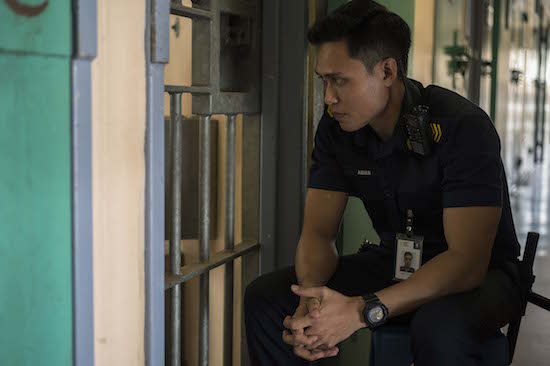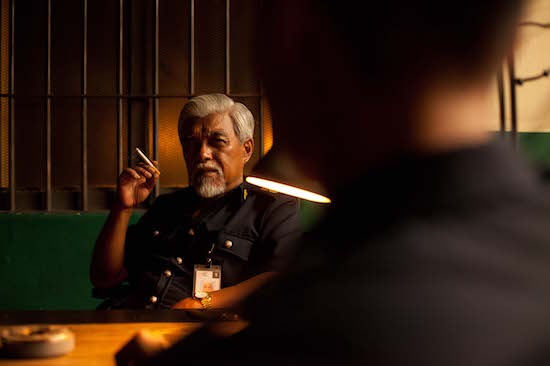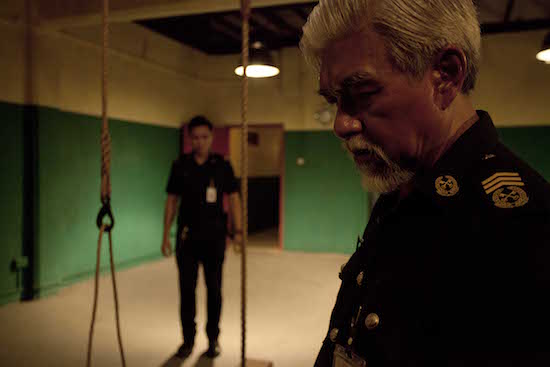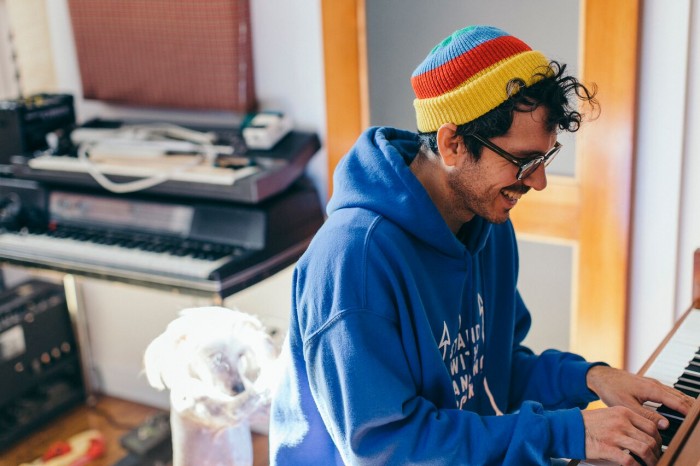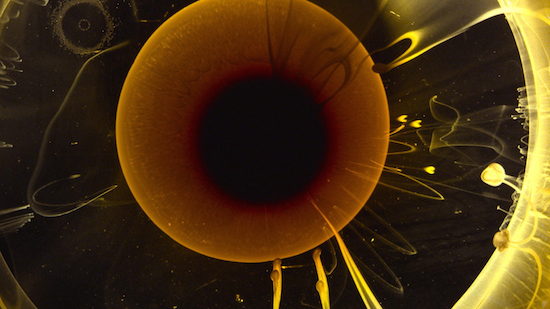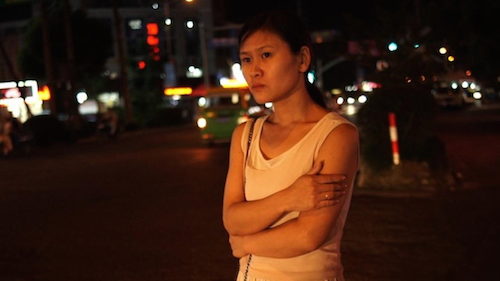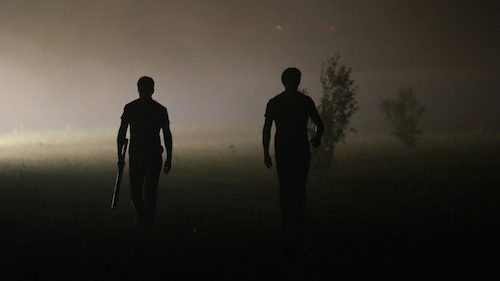- 7 years ago
-
In some recent discussions with musicians, bands, DJ’s and musical creatives, I made the point that for me, a flat performance is pretty much a worthless one. If you can’t take people on a musical journey than it’s just plain boring. It’s the bands and DJ’s that can cross genres that get my attention. Case and point, Tell All Your Friends PR turned us on to the new album from rock trio, Slothrust. After listening to the album, I decided to do a review for the blog. I have to admit, sometimes I don’t get past the first track, but “Surf Goth” got my attention. The idea that they would start the album with an instrumental track was enough for me, and when the show began on Saturday evening at Mercury Lounge it was the first track they played.
Let me start by saying, their sound is on-point and very powerful. Particularly for a trio. They have great chemistry on stage, and their fans (including me) are really into them. Musically, the band members are equally impressive as they effortlessly worked through songs that range from blues to grunge with elements of jazz.
While Kyle Bann (bassist) had a continuous grin on his face, Leah Wellbaum maintained a certain attitude as drummer Will Gorin fiercely hit the skins as if it was possibly his last opportunity to play this year. Highlights from the new album- “Like a Child Hiding Behind Your Tombstone,” “Mud,” “Sleep Eater,” and “Trial & Error,” which Wellbaum explained she wrote in high school. From the older material- “7:30am” and “Magnets, Pt. 2.”
It’s easy to understand why the band appeals to so many people. Musically, they are highly talented, and smart, catchy lyrics such as “Don’t shake hands with the lonely kids because I hear that shit’s contagious” really grab you. If you have the chance to see them live, don’t miss out.
Upcoming Dates: 3/6, Johnny Brenda’s: Philadelphia, PA – 3/7, Black Cat: Washington DC – 3/9, Marble Bar: Detroit, MI – 3/10, Schubas Tavern: Chicago, IL – 3/11, Duck Room: St Louis, MO- 3/12, Tank Room: Kansas City, MO – 3/15, Larimer Lounge: Denver CO – 3/18, High Water Mark Lounge: Portland, OR – 3/20, Sunset Tavern: Seattle, WA – 3/22, Bottom of the Hill: San Fran, CA
Latest News
- 7 years ago
-
Written and directed by Boo Junfeng (2010’s Sandcastle), Apprentice is a quiet yet gritty drama about a newly hired young prison guard who is “promoted” to working on death row. (It was Singapore’s official entry for the 2017 Best Foreign Language Film Oscar.) Unlike other movies of its genre, Apprentice doesn’t go for big, sweeping statements or emotions, but instead shows one man struggling with a soul-wrenching job as he comes to terms with his own family’s past.
We first meet Aiman (newcomer Fir Rahman) as he’s being interviewed for a position as a guard in a maximum security prison. His stated reason for being there is idealistic: he wants to help people change. Initially, pending a background check, he has limited security clearance, i.e. no access to the “condemned cells.” Scenes of him joking around with prisoners in the yard and helping them with shop equipment indicate that he truly does want to help. He glimpses an older, white-haired man in the cafeteria and there is a wary recognition. This is Chief Rahim (played by the excellent Wan Hanafi Su).
Later, when helping another guard move equipment in the condemned block, Aiman brings himself to the attention of Rahim by volunteering information about where to get a certain type of rope. As the camera casually hovers over an open trap door, we realize that this is where hangings take place. The no-nonsense tone and mundane conversation illustrate the businesslike nature of death here.
Scenes at the prison alternate with scenes of Aiman’s rundown apartment, which he shares with his older sister. They don’t have a lot of money and she doesn’t like him working at the prison. When Aiman tells her that he’s met “the hangman,” we find out that Rahim executed their father years ago, when Aiman was a baby.
The chief takes a shine to Aiman and later seeks him out to help fix the scale used to weigh condemned prisoners in order to calculate a quick death. They exchange personal information, including the fact that Aiman had once been a rebellious gang member. He asks pointed questions about the prisoners that Rahim has executed and and later tries to find his father’s files.
When Aiman’s supervisor asks about his family, we learn he was raised by grandparents. He is clearly both haunted by his father’s memory and afraid of being discovered as his son; why exactly does his want to work at the prison? His sister, who is planning to marry her boyfriend and move to Australia, wants Aiman to go with them. Meanwhile Chief Rahim asks Aiman to “learn the ropes” and be his assistant. “We are humane,” he reiterates while instructing Aiman in the specific science of hanging, which is shown very matter of factly, all the more chilling.
As more details unspool about Aiman’s father and his legacy, we see the rituals surrounding hanging and the toll that it takes on both its perpetrators and prisoners’ families. (Capital punishment in Singapore has not traditionally been reserved for murderers only.) The film becomes increasingly more disturbing as we follow one inmate through the steps leading to his death and aftermath. The conflicted Aiman eventually erupts into an emotional confrontation with the chief, with dramatic results.
Apprentice is an unusual look into the specifics of capital punishment and death by hanging, as well as a drama about a man who is driven by his own demons to work in such a place. One of the film’s assets is the compassionate way it deals with both the doomed prisoners and guards who grapple with the emotional toil of their jobs. Junfeng has created a quietly powerful film that makes its point without fanfare and is all the stronger for it.
Apprentice opens on Friday, March 3, at Village East Cinema.
—Marina Zogbi
- 7 years ago
-
We recently caught up with musician, singer, song writer and visual artist Yoni Wolf to discuss the new album from his band Why?. Moh Llean will be released on March 3rd, and is the band’s first release since 2013’s Golden Tickets.
What was the band’s motivation/inspiration for the latest album, “Moh Llean” and how is it different than the band’s previous releases?
I can’t say there is ever a specific motivation or inspiration. We are artists and we are drawn to making art in whatever state– from whatever space we find ourselves. This one was no different, though of course it ends up with its own feel and identity based on our changes and developments as humans.
Is there a particular story you wanted to tell or message you wanted to send with “Moh Llean.”
I would say that whatever the album conveys thematically, it does so naturally without pre-conceptions or agenda. That said, I think it is an attempt at openness in the heart and acceptance and peace.
How did the hip hop element of the band’s sound come to be? Are you guys hip hop fans? Classic or modern day hip hop? Or, was it organic?
I started out as a rapper. Hip hop is at my roots and core. I don’t think this album is very hip hop though.
Tell me about the band’s creative process. Do you work remotely or do you go off to the woods to write together as a group?
I wrote most of the stuff myself. My brother Josiah and I produced and arranged the stuff together. We have a couple musicians– Doug McDiarmid and Matt Meldon, who played on every song, and then about 10 or 12 others who played on a song or two or three.
What band’s or musicians have been major influences?
Life, The Universe, God or the thought experiment to envision whatever that is.
What role does the audience – live or otherwise – play in Why?’s universe?
They enable us to do this. Without an audience there would be no one to communicate these ideas to and therefore no reason to continue.
What do you enjoy most about playing live?
I like the catharsis of singing. It’s like the greatest thing in the world. Doesn’t matter if you sound like Bon Iver or a see-saw. I think everyone should sing.
Is a European tour in the works for this album?
For sure. May/June. 🙂
Visual art seems to be an important part of the band’s work. Are any of the band’s member’s visual artists? Did any of you attend art school?
Yes I am and did. I make all the album art (with help from my lay out designer friends).
What message would you like to send to AFP’s artist community in these rather important and challenging times for artists?
Hang in there and always try to convey your most vulnerable truth through your art. Or just have fun or whatever.
-Frank Jackson
- 7 years ago
-
Founded in 1962, Film Comment has long been the critical voice of art-house and independent cinema, while also offering thoughtful coverage of more mainstream movies. The Film Society of Lincoln Center, which has published the magazine since the 1970s, annually presents the Film Comment Selects festival, which runs this year from Friday, Feb. 17, through Thursday, Feb. 23. Now in its 17th year, the festival screens movies that are not generally shown elsewhere, mixing the new and noteworthy with older, sometimes forgotten films that deserve another look.
The scope of the festival is demonstrated by its opening night films: a premiere of Stéphane Brizé’s A Woman’s Life, an intricate adaptation of the Guy de Maupassant novel; and an Ultra-widescreen IMAX presentation of Terrence Malick’s trippy Voyage of Time, a visual and aural treat. The festival also features a four-film tribute to recently deceased cinematographer Raoul Coutard and revivals including 1972’s The Effect of Gamma Rays on Man-in-the-Moon Marigolds and rarely seen 1962 short On the Harmfulness of Tobacco, both directed by Paul Newman.
Here’s a look at a couple of other films to be screened:
Bitter Money, Wang Bing’s rambling, fly-on-the-wall documentary about Chinese migrant workers, is sometimes a tough slog. His loose, observational style doesn’t always serve the stories of his subjects—various individuals who have traveled to Huzhou to work in the city’s garment factories—nor does it consistently engage the viewer. Nevertheless, with its scenes of both numbing tedium and startling violence, Bitter Money paints a grim picture of Chinese capitalism that eventually gets under the skin. (Those who are familiar with Wang’s nine-hour West of the Tracks, might be relieved by the new film’s two-and-a-half hour runtime.)
The film starts out with 15-year-old Xiou Min and her cousin planning then taking the long, grueling train trip to Huzhou, but soon leaves them to follow Xiou’s laundry co-worker Ling Ling, who is embroiled in an abusive relationship with her awful husband, Erzi. In the film’s roughest scene, we watch him brutalize her while most of his friends stand around; one wonders if this wildly dysfunctional couple are playing it up at all for the camera. Other subjects include an older alcoholic worker and a guy resigned to the fact that he’s too slow to last at most factories. Much of the “action” takes place at the workers’ bleak dormitory-style housing and in the cramped workrooms where they toil and bide their time, hoping for a job in one of the city’s bigger factories. Overall, it’s a depressing look at the places we fear our inexpensive clothes might come from. Screens Thursday, Feb. 23 at 6:30 pm.
Bogdan Mirică’s impressively assured debut feature Dogs is a bleak, often perversely comic, crime drama set in rural Romania. The setting’s barren, scrubby landscape is reminiscent of an American Western, as is the dark twang of its soundtrack; sure enough, the story involves bad guys who have settled on a lawless piece of land.
When city slicker Roman (Dragoș Bucur) comes from Bucharest to survey (and sell) land he inherited from his grandfather, the property’s ornery caretaker and equally ornery dog are initially his main irritants. “Your grandfather led a busy life,” hints weathered police chief Hogas (Gheorghe Visu), as he and Roman discuss recent local occurrences, including the disappearance of an acquaintance who was brokering the property’s sale and the appearance of a severed foot in a pond.
As Roman slowly uncovers the area’s ongoing criminal activity and finally meets deceptively friendly ringleader Samir (Vlad Ivanov), he’s repeatedly advised to go home, as he’s clearly out of his league out in these parts. A surprise visit from his beautiful girlfriend pretty much insures that things will get much worse. A few critics have cited similarities to No Country for Old Men and like that film, Dogs features an aging lawman, a merciless killer, and a growing body count, in addition to a Coen Brothers-like deadpan sensibility. Though Dogs may not be quite as resolved as that film, it’s an impressively moody piece of work, and Mirică is clearly a director to watch. Screens Thursday, Feb. 23 at 9:30 pm
Click here for the complete festival line-up and ticket information.
—Marina Zogbi
- 7 years ago
-
Returning to New York Fashion Week this season is none other than Kayne West, debuting his fifth season of Yeezy for Adidas.

The collection featured oversized sweatshirts, slouchy outerwear, and utilitarian trousers — all restricted to neutral tones.
See some of the looks for yourself.
YEEZY SEASON 5 FINALE #MafiaSZN pic.twitter.com/CK9XB12C8Z
— YEEZY MAFIA (@theyeezymafia) February 15, 2017
West’s presentation of looks also included the kickoff of the much-Instagrammed Calabasas line, Refinery 29 reports.
Photo Credit: AKM-GSI
The 15-minute showcase took place at Pier 59 Studios — an old-line NYFW locale — and attracted celebrities including his wife Kim Kardashian, sister-in-law Kylie Jenner, LaLa Anthony, Teyana Taylor, Hailey Baldwin and more.
Whatever or whoever we were talking about must have been good @haileybaldwin 😂😂Yeezy fashion show was 🔥🔥🔥🔥🔥🔥🔥🔥🔥🔥🔥🔥🔥🔥 pic.twitter.com/ySpOe6dnsA
— LA LA (@lala) February 15, 2017
Cameos from models included Luka Sabbat and Amina Blue, and the show marked the launch of Halima Aden — the Somali-American stunner who is IMG Models’ first hijab-wearing model.
Model wears a headscarf at the #yeezy show 💖 #diversity xoxo pic.twitter.com/3M40u3yOPX
— Edward Enninful OBE (@Edward_Enninful) February 15, 2017
The rapper/designer with Teyana Taylor
Photo Credit: Walik
Check out more looks from the showcase below.


